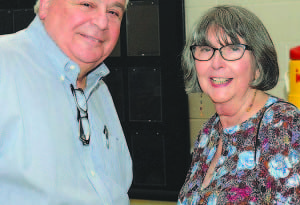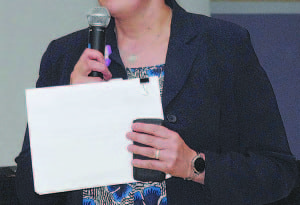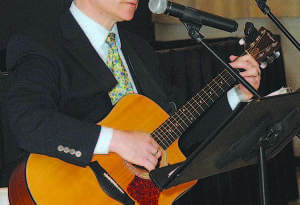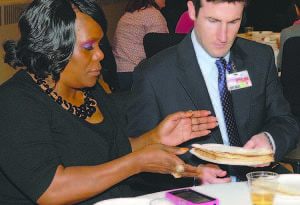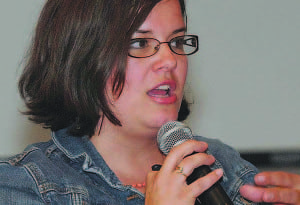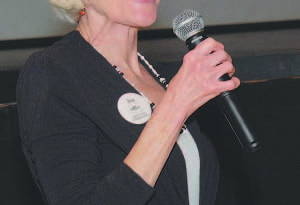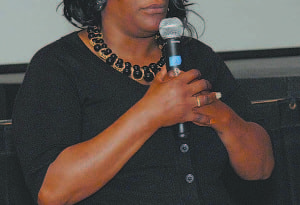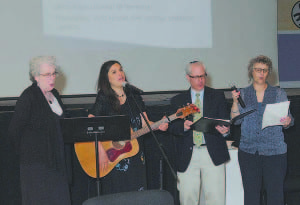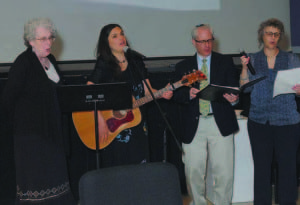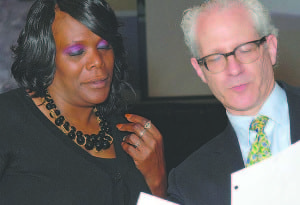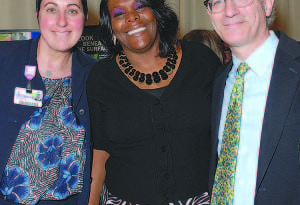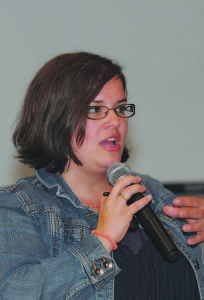 At the Passover Seder each year, we retell the story of our exodus from Egypt and the bondage we endured under Pharoah. As we sit at our tables, enjoying our freedom, knowing that we are safe, with plenty of food on the table and family and friends all around, we don’t usually think of slavery today.
At the Passover Seder each year, we retell the story of our exodus from Egypt and the bondage we endured under Pharoah. As we sit at our tables, enjoying our freedom, knowing that we are safe, with plenty of food on the table and family and friends all around, we don’t usually think of slavery today.
But there is slavery today. It takes the form of human trafficking, addiction, oppression and poverty. On Monday, April 18, KentuckyOne Health; the Jewish Community Relations Council; Jewish Family & Career Services; National Council of Jewish Women, Louisville Section; Compassionate Louisville; ChooseWell Communities and Just Creations joined forces to raise awareness of these issues through a Human Trafficking Seder at The J.
Rabbi Dr. Nadia Siritsky, KentuckyOne vice president of mission, put the Seder together and organized the event.
When people think of human trafficking, the first thing that comes to mind is prostitution, but that is only one aspect of the problem. Human trafficking also encompasses all forms of exploitation through which people are held against their will and/or forced to do things they might not want to do. The victims are being coerced, lied to and threatened.
Marissa Castillanos of Catholic Charities explained that in addition to sex workers, those who are enslaved today are victims of labor trafficking. Farm workers, miners, restaurant and hotel workers are often among those who are trafficked.
The young are the most vulnerable. In Kentucky, she said 332 victims of human trafficking have been identified – 197 of them children, and the youngest was just two months old. Young people, ages 15-17 are the most frequent victims.
Angela Renfro, the founder of the Kristy Love Foundation, was passionate in her plea for help for the victims of trafficking. She shared that she had been a victim of sex trafficking and did not escape until she was 29 years old. Today, the Kristy Love Foundation rescues people from traffickers, providing them a safe place to stay and a path to independence and freedom. The Kristy Love Foundation relies on donations to fund its work, and she made an appeal to those present.
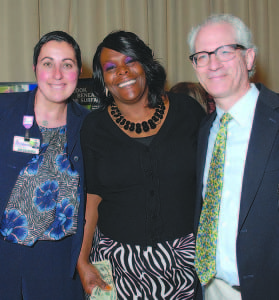 Tricia Lloyd-Sidle of Just Creations explained that another way to combat human trafficking is to buy Fair Trade products. They may cost a bit more, but as a buyer, you know that the people who produce Fair Trade products are paid a fair wage for their work and are not coerced to do it. Just Creations is a nonprofit store that sells only Fair Trade products.
Tricia Lloyd-Sidle of Just Creations explained that another way to combat human trafficking is to buy Fair Trade products. They may cost a bit more, but as a buyer, you know that the people who produce Fair Trade products are paid a fair wage for their work and are not coerced to do it. Just Creations is a nonprofit store that sells only Fair Trade products.
KentuckyOne’s Shane Fitzgerald, vice president of mission for Our Lady of Peace and Sts. Mary and Elizabeth and Flaget Memorial Hospitals, said KentuckyOne’s mission is to bring wellness, health and healing to all including the underserved. He explained that when he and Rabbi Siritsky talk about mission, it encompasses not only KentuckyOne, but the entire community.
Fitzgerald echoed Castillanos’ remarks. There is human trafficking in Kentucky and KentuckyOne is working to educate its staff to recognize the victims of human trafficking and offer victims hope.
As the Human Trafficking Seder was an open event that drew people of many faiths, the rest of the Seder was designed to explain parts of the Seder to those who might not be familiar with the traditions while drawing parallels between the Hebrew slaves in Egypt and the victims of human trafficking today. It included tastes of matzah, maror, parsley and charoset.
Cantors Sharon Hordes and David Lipp, Rabbi Gaylia Rooks and Shiela Steinman Wallace presented music to reinforce the message and encourage action, including an updated version of Bob Dylan’s “Blowing in the Wind.”
Jewish Community Relations Council Director Matt Goldberg wrapped up the evening by sharing the text of the Runaway and Homeless Youth and Trafficking Prevention Act now under consideration by Congress. The bill would expand funding for research, data collection and collaboration; create a National Runaway Youth Hotline; and require those who receive grants from the existing Runaway and Homeless Youth Act to have a plan for working with outreach programs to attract runaway or homeless youth who are victims of trafficking.
He urged those present to contact their senators and representatives urging passage of this bill and even provided a sample letter. The information sheet about the proposed act and the sample letter can be found on www.jewishlouisville.org/humantrafficking.



